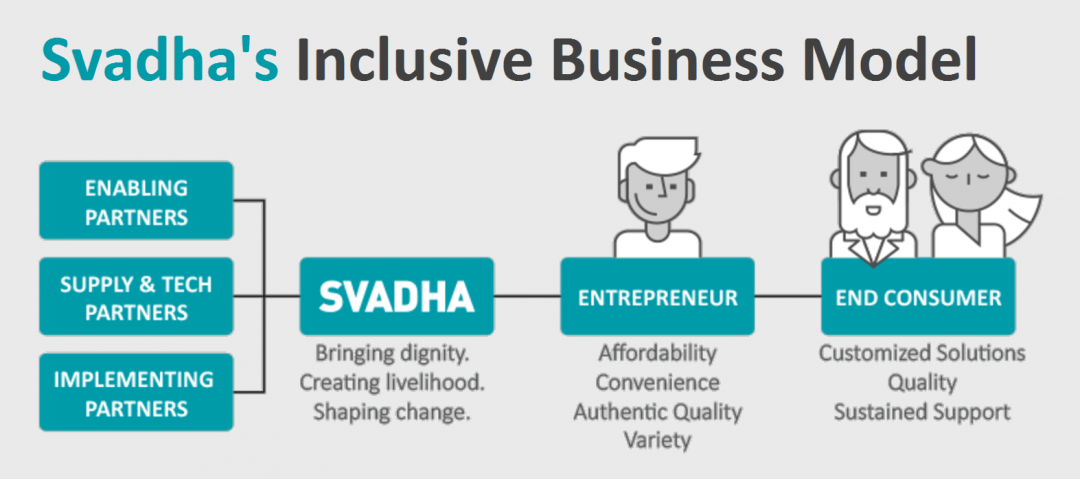Beyond Building Toilets: Complete, Aspirational, and Sustainable Sanitation Solutions
In the provision of water, sanitation, and hygiene (WASH) solutions to the BoP (Base of the Pyramid), global progress has been hindered by inefficient and ineffective value chains which lack catalysing mechanisms to reach universal access. These catalysing mechanisms include focusing on consumers’ aspirations – or wants, rather than just needs – and scalable, sustainable models. There are a lot of players in the space of WASH demand creation, but very few who can efficiently deliver customized products and services with guaranteed quality. To improve sustainable sanitation access for all, there is a need for innovative products and services and an organized sanitation market!
Svadha’s Ashoka-awarded PIE model creates an organized WASH ecosystem by tailoring solutions for rural customers through design research and negotiating directly with suppliers to deliver quality products at affordable prices for the rural customers. Svadha engages an army of entrepreneurs who engage with rural customers and provide a one-stop shop of WASH solutions. From sales to supply and education to enablement, the sanitation entrepreneurs are trained by Svadha to distribute the user-centric solutions. This integrated system provides opportunities for greater livelihoods and dignity for both the entrepreneurs and users and allows our suppliers to reach previously untapped markets.

At Svadha, we are not only concerned about building toilets: we want to provide holistic, aspirational, and sustainable solutions. We understand that a new toilet is a momentous occasion and investment for our rural customers, so it should last as long as possible. With this in mind, Svadha provides the highest quality toilet components for our customers – sent directly to us from manufacturers and then inspected for quality in our distribution centre. To prevent the “BoP penalty” of higher prices due to higher distribution costs in rural areas, we provide free transportation on all of our supplies, allowing our entrepreneurs to remain profitable. These conditions have allowed the creation of a local, commercially-viable supply chain and thus a sustainable solution for WASH.
But we must think beyond simply building toilets. How can we ensure the sustainability of both our end-consumers’ toilets and the businesses of our entrepreneurs?
Our model establishes local entrepreneurs who grow their business in their own communities – thus preventing that age-old problem in development programs in which the technical skills and maintenance know-how leaves along with the projects’ completion. Furthermore, Svadha has tied up with a leading insurance agency to enable our entrepreneurs to sell a unique product – insurance for toilets. Though our toilets are built with high-quality materials, our end-consumers can have peace of mind that their investment is protected from events like falling trees and cyclones (high-risk in Odisha) for less than $1 (60 INR) for 5 years.
For our entrepreneurs, we must also consider how they can continue business through the rainy season (July through September), during which construction demand is low. How can our entrepreneurs continue to bring in revenue in these months? In the long-term view, what happens when our entrepreneurs have saturated their markets with toilets?
Our answer to addressing these issues for entrepreneur sustainability (and ours) is to diversify our portfolio. We’re looking at providing add-on technologies for toilets, such as waste decomposition technology (e.g., Tiger Toilet worms), which can be added to waste collection pits to prevent them from filling for 25 years. This simultaneously prevents a common issue which results in households ‘back-sliding’ away from toilet usage: when the pit becomes full, there may be no one may be willing to empty the pit due to the social stigma of handling waste and the smell. So far, we have created 376 Svadha Green biotoilets.
We’re also looking for products which simultaneously have higher demand in the construction off-season, are of interest to our entrepreneurs, and still fit our core mission of providing aspirational WASH solutions. We will be extending the reach of our hygiene kit (Svadha Care) – a product of importance in any season, but particularly during the rainy season when WASH-related illnesses are highest. In the next quarter, we will also pilot colourful paints, which were identified as a product of interest by our entrepreneurs, including through the rainy season, and can be used to make our toilets further aspirational and visible in communities.
Inclusivity in mind
As a provider of complete sanitation solutions, we aim to be inclusive of the needs and aspirations of all household members. We ask: How can we develop solutions that increase the ease of toilet use for elderly and disabled? Or how do we help families transition their young ones to be “potty-trained”? This is a major challenge, especially in the rural India context in which toilet usage is a new practice. But we’re turning to the field for insights.
By thinking how we can provide holistic solutions, we’re simultaneously creating more value for all stakeholders. Our suppliers can reach new markets through us and our entrepreneurs, our entrepreneurs grow their business opportunities, and our customers now have access to products that have yet to be available in their markets.
We welcome opportunities to continue the conversation and work with implementation partners. If you’re interested in learning more, follow our activities on social media (Twitter, Facebook, Instagram) .
